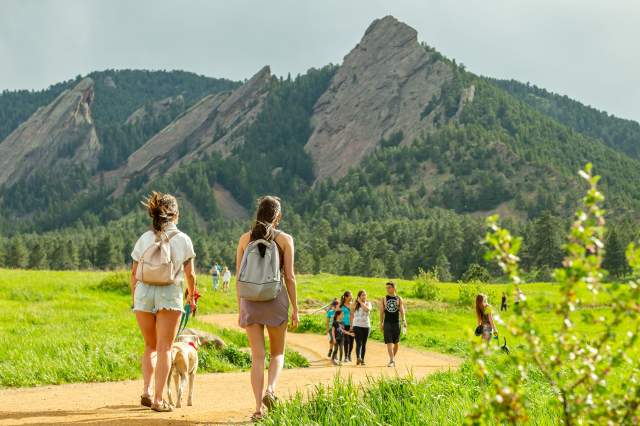Green Boulder
A Destination for Eco-Conscious Travelers
If traveling sustainably is important to you, then Boulder should most definitely be on your (100% recycled) must-visit list. When you come to Boulder, you’ll be traveling to a place that has been a leader in environmentalism for decades and continues to make green living a priority. Here are just a few ways the city has united to conserve land and resources.
Drawing the "Blue Line"
In its early years, Boulder's mountain backdrop was threatened by proposed developments. So in 1959, Boulder citizens spoke out and created a charter amendment to prohibit water service above a stated contour of elevation, known as the "Blue Line." The definition of the "Blue Line" is the line above which the City of Boulder will not supply water for domestic, commercial or industrial uses.
See Green, Be Green: Today, as you look to Boulder's mountain horizon, you can see where development stops and a natural landscape remains.
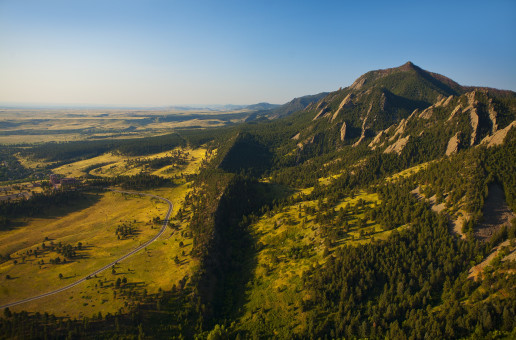
Beyond the Blue Line are Boulder's foothills and forests
46,000 Acres of Open Space
As early as 1898, Boulder residents began purchasing land with the purpose of protecting Boulder's natural beauty. In 1967, Boulder became the first city in the U.S. to tax itself for the acquisition, management and maintenance of open space. Today, there are 46,000 acres of this open space in and around the city that's managed by the City of Boulder Open Space and Mountain Parks, giving residents and visitors instant access to forests, mountains, plains and wetlands for nature walks, hiking, biking, rock climbing and simply clearing your head.
Help protect these pretty and precious acres. Remember to stay on the trail, even when it’s muddy. Stepping off the trail creates erosion and widens the trail into natural habitat.
Preserving the Views, Too
In 1971, another effort was made to protect the view of Boulder's precious foothill mountains. A charter amendment was created that limited the height of new buildings to 55 feet. Since then, the amendment has been modified and building heights are capped at 35 feet in most of Boulder and property owners can ask for modifications for up to 55 feet.
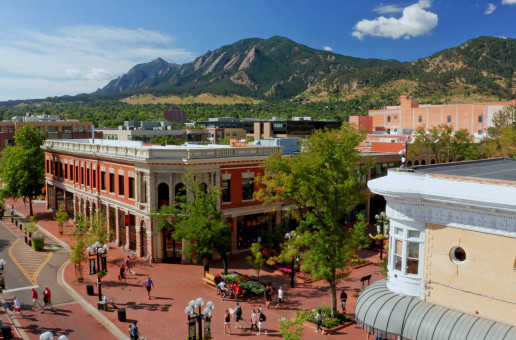
Boulder's building-height restrictions are designed to preserve views
An International Climate Leader
Boulder has been recognized by CDP, a global environmental reporting organization, for its bold leadership on environmental action and transparency. The city of Boulder has continually made the “Cities A List,” earning the CDP's highest rating, which just 120 cities in the world received in 2023.
Zero Waste Efforts
Composting is common practice in Boulder. That’s because the city’s Universal Zero Waste Ordinance requires properties in Boulder to have separate compost, recycling and trash services. So you can dine out with a clear conscience, knowing whatever food and kitchen scraps are left over will be steered clear of landfills.
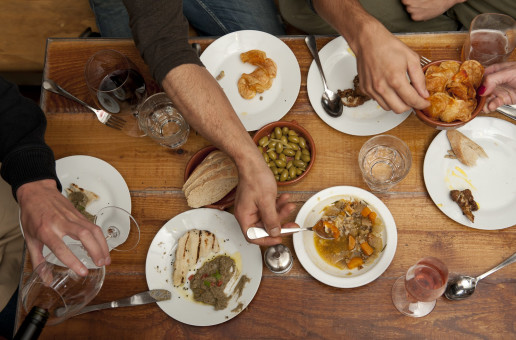
Boulder restaurants and businesses proactively compost and recycle
Boulder's award-winning recycling center is a marvel of innovation, and you can actually take a self-guided tour (or a guided tour for 10 more people). Learn more about tours here.
Getting Hikers to Trails More Sustainably
Through pioneering partnerships and programs, five land-management agencies provide Boulder County residents and visitors with four hiker shuttles that run seasonally. They provide car-free access to some of the most popular trailheads in Colorado — Chautauqua, Eldorado Canyon State Park, Indian Peaks Wilderness Area and Rocky Mountain National Park. Riders can enjoy a convenient, low-stress way to access some of the most beautiful (and popular) city, state and federal public lands near Boulder while reducing congestion and limiting car emissions.
Pro Tip: If you take the summer weekend bus to Rocky Mountain National Park, you can skip the step of making a timed reservation. Learn more.
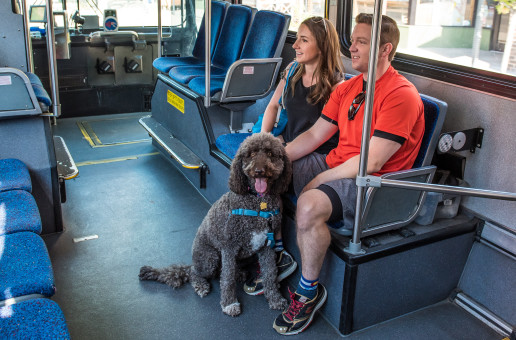
Hikers and their pup ride the Park to Park shuttle to Chautauqua
Car Chargers Galore
Traveling in a plug-in electric vehicle? You’ll be pleased to know there are 48 electric-vehicle charging stations all over Boulder — from the parking lot right at the foot of the Flatirons to downtown city-run parking garages. The city also aims to electrify its entire fleet by 2030.
The scenic Peak to Peak Scenic Byway is officially registered as a Colorado Electic Vehicle Byway. This means you'll find multiple dual-port DC fast charging stations between the start and end points of this historic byway. You can locate electric charging stations on the U.S. Department of Energy's website.
Making Two-Wheeled Transportation Safer and Easier
In and around Boulder are more than 300 miles of bikeway. You could say we are a bike-obsessed town. Boulder has 96 miles of bike lanes, 84 miles of multi-use paths, 50 miles of designated bike routes. After a snowfall, the bike paths often get cleared before the streets do! In 2023, Boulder became the first U.S. city to build tall concrete curbs for bike lane protection, following the lead of other North American cities like Toronto. These curbs also showcase vibrant mural art from local creators.
See Green, Be Green: If you’d like to bike around town, we have e-bike rentals, public bike kiosks and bike shops with bike rentals galore. Or you can be extra spontaneous and opt for an e-scooter.
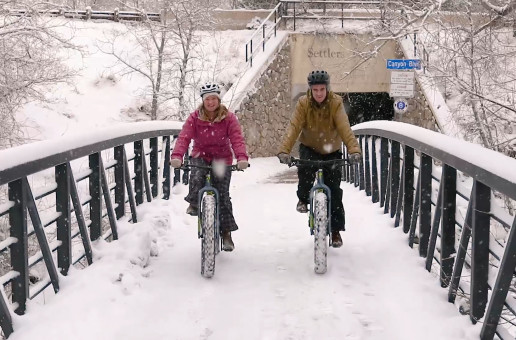
Biking the Boulder Creek Path in winter
Fervidly Reducing Carbon Emissions
In the Boulder Climate Action Plan, the city has set out to reduce carbon emissions by 70 percent by 2030, hit net-zero emission by 2035 and become carbon-positive by 2040. Boulder made national news and history in 2006 when introducing a “carbon tax” on the use of electricity generated from fossil fuels, the first of its kind in the United States. The carbon tax generates about $1.8 million each year, and these funds go toward implementing the Boulder Climate Action Plan.
Flying into Denver International Airport? You can ride a bus from DEN to downtown Boulder by hopping on the AB/AB1 route, operated by RTD. Boulder's super walkable, or you can rent a car once you're here.
Turning Poop to Potting Soil
Boulder offers a dog-waste composting program at many popular trailheads, saving approximately 25 to 30 tons of dog waste from entering landfills and turning the waste into a beneficial compost mixture.
See Green, Be Green: If you're traveling with your doggo, you can help us keep our trails and parks poop-free as required by law.
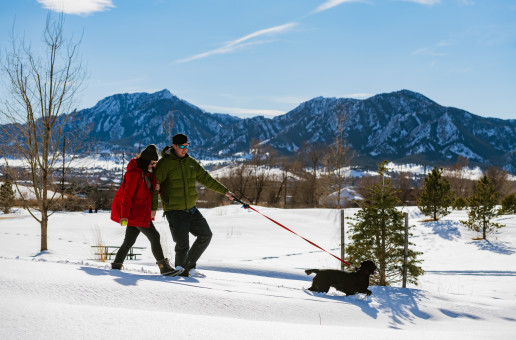
Hyperlocal Dining and Food Programs
With more than 1,000 farms in the county, Boulder puts regenerative agriculture at the forefront and provides hyper-local fare to the community through food programs. MASA Seed Foundation's mission is to enable a vibrant, local food system for the community by providing a bio-regional seed bank and locally adapted plants and produce. Sunflower Farm is creating its own production farm, Sunflower Farm Acres, to help feed the local community while regenerating the 40+ acres of land on their farm. These are just a couple of examples of how Boulder's farms are giving back to the community in big ways.
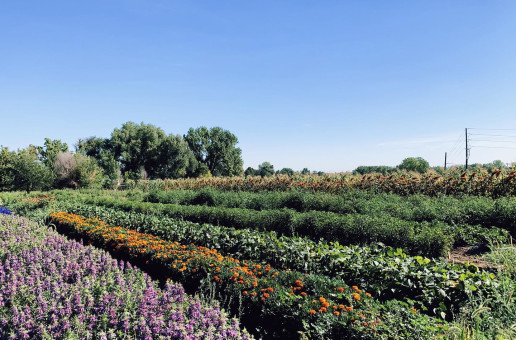
Cutting Edge of Climate Science
Often when you hear about climate science research in the news, you’ll notice it was conducted by scientists in Boulder. The city leads the charge when it comes to weather and climate expertise, with the top national labs and institutes based here. In 1965, the first scientific conference on the causes of climate change took place in Boulder, and the University of Colorado Boulder partnered with United Nations Human Rights to co-host the Right Here, Right Now Global Climate Summit.
The Conference on World Affairs, held every April at the University of Colorado, brings in experts from all over the world for four days of panels, keynotes and events. There are always lively sessions on climate to attend — and it's all free!
Big-Hearted Businesses
Boulder has the highest per-capita concentration of B Corps in the nation. Those are companies where environmental conservation and social responsibility are equally as important as revenues. This includes organizations like Namaste Solar, Bhakti Chai and Conscious Coffees. The city is also home to many environmental-focused organizations and companies, such as Eco-Products, Environmental Defense Fund, Access Fund, Leave No Trace Center for Outdoor Ethics, EcoVessel and more.
See Green, Be Green: Shop green at places, like Momentum (gorgeous, fair-trade goods), Nude Foods Market (organic foods and household products in zero-waste, reusable containers), Art Parts Creative Reuse Center (second-hand art supplies and found objects) or a huge number of Boulder thrift stores.
Public Transportation Made Fun and Easy
Boulder's convenient HOP shuttle makes a loop through Boulder's fairly compact geography, hitting downtown, Twenty Ninth Street, the University of Colorado, and the Hill along the way. The frequency is 12-20 minutes and the fare is just $3 (fare serves as a 3-hour pass). It's a great way to get around to all the major sights in Boulder. More options within Boulder include the SKIP, which runs north and south along Broadway, and the BOUND, which travels up and down 30th St.
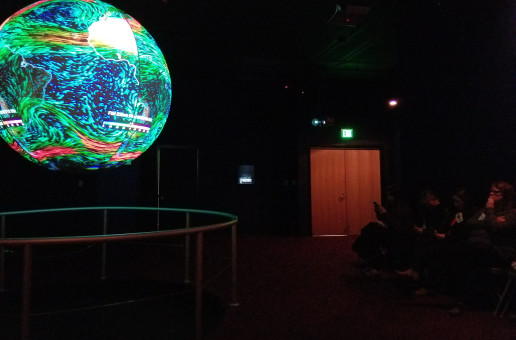
A weather projection at the National Oceanic and Atmospheric Administration
Free Water and Energy Conservation Services
Boulder County’s Partners for a Clean Environment (PACE) program provides commercial and residential customers with free water and energy services. Their programs have led to more than 3.7 megawatts of solar installations on homes and businesses, reduced an estimated 36,000 metric tons of CO2e annually (the equivalent of taking 7,620 cars off the road), and saved an estimated 42 million gallons of water annually.
Colorado is home to tens of thousands of furry, scaly and feathered creatures. To keep them — and you — safe, don’t approach or feed them.
Energy Conservation in New Builds
The City of Boulder Energy Conservation Code is our city's version of the 2018 International Energy Conservation Code — except it is 20 percent more efficient than the national code. It prescribes minimum energy efficiency and conservation standards for new buildings and for additions and alterations to existing buildings in an effort to help our city meet broader climate commitment goals.
More Ideas for You
Eco-Friendly Travel
Are you a traveler who likes to minimize your impact when you visit a place? You’re not alone…
Care for Colorado
When you come to Boulder, or any place in Colorado, you might get a sense that locals love the…
Car-Free
One of the best perks of visiting Boulder is its compact, walkable geographical area and ease of…





